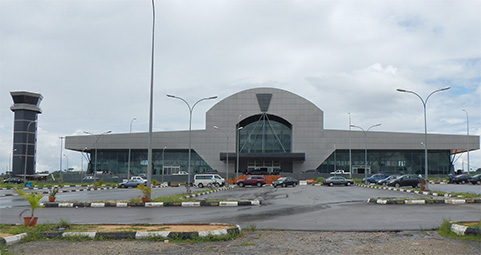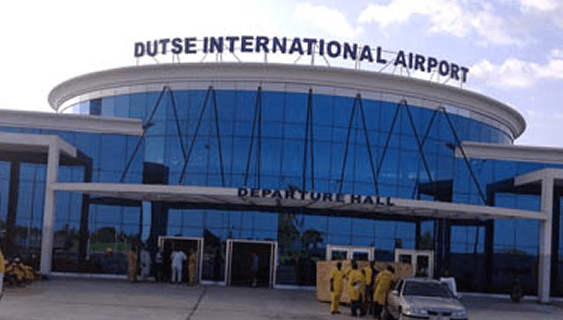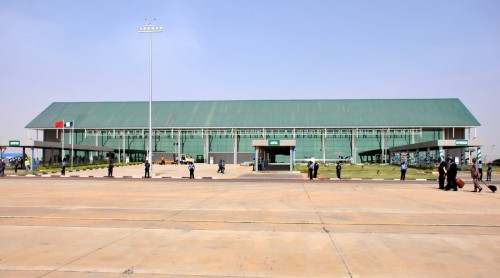It is no longer news that Governor Kayode Fayemi of Ekiti State has laid the foundation for the Ekiti Cargo Airport in Ado-Ekiti but what is not clear is the need for the facility, which is estimated to cost the state and its partners about N20 billion.
There are two major concerns on the reason(s) why Fayemi and his predecessor are bent on building an airport in the land of honour. One of them is the fact that the Akure Airport, which is undergoing reconstruction to operate as a full-fledged cargo airport, is only 55.3 kilometres away from Ado Ekiti (1:40minutes drive), where the foundation of the facility was laid.
Another concern is that the facility has witnessed reversals about six between 2010 and 2019 (during the first and last administrations of former Governor Ayo Fayose and Fayemi), which is an indication that the duo appear desperate to construct the airport as a status symbol.
[READ MORE: Enugu Airport rehabilitation billed for next year – Aviation Minister]

Unviable airports
While Governor Fayemi is bent on having an airport in the state, about six state governments in Nigeria, that have committed over N100 billion to unviable or abandoned airport projects, have gotten their fingers burnt.
Many of the partly completed airports, which scattered across Nigeria, have since remained almost non-functional, even with the huge funds sunk into them.
For instance, Akwa Ibom, Delta, Bauchi, Jigawa, Kebbi and Taraba states, have spent N20 billion, N37.01 billion, N7.9 billion, N15.5 billion, N17 billion, and N17 billion, respectively, on airport projects, which according to stakeholders, have done little or nothing to improve their economies. This puts the total spending across the six states at N101billion.

The reality is that the Uyo airport is not generating sufficient revenue to cover its maintenance and operational costs. Currently, the average monthly revenue to the Uyo airport is between N28 million and N30 million, while the monthly recurrent expenses is between N32 million and N34 million. This excludes calendar maintenance, recalibration, retraining, equipment overhaul and upgrades. The airport was not intended to be subsidised with funds from the state government’s purse after twelve years into commercial operations.
In the case of Asaba Airport, Delta State, Governor Ifeanyi Okowa, in a quarterly media parley, disclosed that he had sourced a N5.01 billion loan to finish up work at the airport, whose foundation stone was laid in May 2008 under the immediate past governor, Emmanuel Uduaghan’s administration. This brings total cost of the airport to N32 billion, as the previous administration said it spent N27 billion to build it.
The airport in Dutse, Jigawa State, shows the ridiculous extent to which governors go to build airports. Aside from lacking the necessary facilities to function optimally, reports have it that a former governor had to enter into an agreement with an airline which operated twice-weekly flights, bringing in between five and 15 passengers per flight. This is a colossal waste of public funds, the repercussion of which is being felt in this period of economic crunch.
In Birnin Kebbi, the airport there is functioning because the Kebbi State Government subsidised its maintenance to the tune of N5 million monthly, according to reports. “The airport has a total workforce of 210 from the state and 22 from the Federal Government,” the Airport Manager, Umaru Mande, was quoted as saying. For this reason, the state government, Mande said, had to approve N4.5 million monthly for salaries.
These mushroom airports pose risks to lives. Last month, at another airport in Bauchi, passengers had to disembark from their flight using an improvised ladder.
While many of the airports were envisaged as status symbols, others came up merely to facilitate the airlift of pilgrims to Saudi Arabia. This point was made by a former managing director of the now-defunct Nigeria Airways, Mohammed Joji, who reportedly claimed that the “only reason why these states want to build airports is because of the Muslim holy pilgrimage, Hajj, which is done yearly. Other times, the airports are left unmanaged until the next Hajj period, which is not right.”

NBS report
According to the data obtained from the National Bureau of Statistics by Nairametrics, the unviability of the airports is glaring. For instance, while airports in Lagos, Abuja, and Rivers States recorded a total of 9.16 million passengers (arrival and departure) in 2018 alone, Akwa Ibom, Delta, Bauchi, Jigawa, Kebbi and Taraba only recorded 1.616 million passengers (arrival and departure) in 2018.
States with proposed airport projects
Ekiti is only one out of seven states with proposed airport portfolios; others are Osun (N11 billion), Nasarawa (N20 billion), Zamfara (N28 billion), Anambra (N20 billion), Ogun (N22 billion), and Lagos (N102 billion).
In spite of the unviable nature of these airports, other states, among them Ekiti, Osun, Ogun, Delta, Anambra, Nasarawa, Zamfara and Abia, are insisting on this unwise path. For a state like Ekiti, with internally generated revenue of only N6.46 billion in 2018, its fascination with owning an airport is indeed surprising, when one is lying under-utilised in Akure, Ondo State, just about an hour’s drive away. The same goes for Ogun’s proposed cargo airport, a mere stone’s throw from Lagos.
The truth remains that many governors have robbed their citizens of the benefits of good governance because of their predilection for frivolous projects. This is traceable to the monthly dole from Abuja, which is a strong reason for the Federal Government to stop the idea of giving bailout funds to states. With the poverty in the land, how many people can afford the cost of flights in the country?
[READ ALSO: Buhari approves N10 billion for the upgrade of Enugu Airport]

Lessons from other climes
In other parts of the world, the main considerations for siting airports are economic viability and health concerns. In the United Kingdom, where there is an ongoing debate on the expansion of the Heathrow Airport, the Transport Secretary, Patrick McLoughlin, said factors that would carry the day include the potential benefit to the region and the impact of airport expansion on “carbon targets, noise and air quality,” the UK’s Telegraph online reported.
All over the world, government involvement in the building and running of airport facilities is reducing to just regulatory. For instance, the London Gatwick Airport, formerly owned by a Spanish company, Ferrovial, was bought over by a United States-based investment fund, Global Infrastructure Partners, which has a Nigerian, Adebayo Ogunlesi, as the chairman. GIP, which also has 75 per cent interest in London City Airport, has added Edinburgh Airport in Scotland to its collection.

















Please review your comments on Akwa ibom victor attah int’l airport. It is quite unfortunate you grouped this airport with other nonviable state owned airports and the report on passengers ratio is also not true. Victor attah international airport is a hub to ibom air flying three daily flights to lagos and abuja. It serves the neighboring states of Abia and Cross river states. Please cross check for further verification.
False information on Akwa ibom airport.
The Akwa ibom airport is the 5 busiest airport in Nigeria in terms of passenger traffic and the fourth busiest in Nigeria in terms of aircraft traffic. The airport is also one one of the only two airports in Nigeria with a CAT II runway.